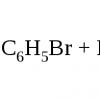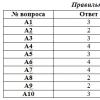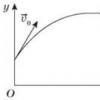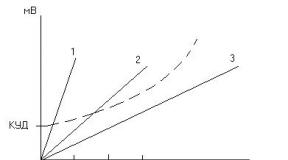International auditing standards and assessment of the quality of audit services (Loseva N.A.). Application of international auditing standards International auditing standards bibliography
Modern business trends provide for ever closer international cooperation. Financial and accounting statements must be understandable to counterparties, first of all, in terms of their content.
In 2017, the Russian Federation saw large-scale changes in domestic auditing towards increased transparency, objectivity and convergence with international norms and standards.
Let's consider the features of the application of international auditing standards (ISAs) at domestic enterprises.
What are ISAs?
International auditing standards(ISA), or in international transcription (English) International Standards on Auditing (ISA) is a set of documentation containing professional requirements and conditions for conducting audit activities. They are published by the International Accounting Association, through the Committee on International Auditing and Assurance Standards.
In the Russian Federation, only a part of these standards is used, but gradually the set of them for use in domestic audit is expanding, especially large-scale dynamics occurred in 2017.
IMPORTANT! The main difference between ISAs is the priority of content over form: they are not based on rigid regulations, but on flexible principles of appropriateness, reliability, completeness and neutrality.
ISA classification
The set of international auditing standards consists of documents covering the following aspects of auditing:
- introductory part - the basics of the approach to auditing and other activities to confirm the quality of services and the reliability of information, an overview of terminology;
- general principles of quality control, auditor responsibilities, basic documentation, information exchange with the business owner;
- standards aimed at assessing risks and countering identified risks;
- standards aimed at evidence and confirmation of audit information;
- standards regulating the services of external auditors;
- standards according to which audit findings are formulated;
- special aspects of the audit: analysis of financial statements according to special purpose principles.
If we compare ISAs with Russian auditing standards, we can classify them as follows:
- International standards applied in the Russian Federation or close to them.
- International standards, whose analogues in the Russian Federation differ significantly.
- MSA, which is not used at all in the Russian Federation.
- Domestic standards, which have no analogues in the ISA.
Main objectives of International Standards on Auditing
Adherence to international standards in financial reporting and its verification is intended to unify accounting procedures, but at the same time allows for the preservation of national business traditions inherent in the domestic economy. Using the results of an ISA audit, you can objectively compare the activities of enterprises in different countries, which is very convenient for international investment.
Some states strictly adhere to ISAs and even accept them as national ones; some others (England, USA, Canada and Sweden) prefer to use their own standards, without rejecting international requirements. The third group of countries, including Russia, are developing their own auditing standards, taking as a basis those adopted by the international Committee.
The main goal of developing international standards is:
unification of business activities of states with similar economic principles within the framework of the global economy.
It is implemented in two main directions:
- harmonization of rules and requirements adopted in individual countries to enable better integration into the global economy;
- raising the level of audit activity to a general economic level (if it is reduced in a particular state).
Changes
In 2017, orders of the Ministry of Finance of the Russian Federation dated October 24, 2016 No. 192n and November 9, 2016 No. 207n “On the introduction of international auditing standards on the territory of the Russian Federation” came into force. The first introduced 30 international auditing standards, and the second introduced 18 more.
They must be applied if the contract for the audit was concluded no earlier than January 1, 2017 (in this case, the audit can still be carried out according to the old standards).
Application of audit according to ISA at enterprises
Enterprises maintain financial statements, and if this occurs in accordance with the requirements of IFRS (the international financial reporting system), then it must be verified in accordance with international requirements. As a rule, such reporting is carried out, and therefore will be the objects of international audit, by the following organizations:
- companies that have active foreign partners;
- legal entities planning their entry into the international economic arena;
- entrepreneurs looking for foreign investors;
- organizations receiving loans from foreign banks;
- enterprises professing the corporate values of international financial associations.
FOR YOUR INFORMATION! Within the framework of domestic legislation, this list necessarily includes credit and insurance companies, non-state pension funds, federal unitary enterprises (according to the list approved by the Government), joint-stock companies whose shares belong to the state, and any enterprises trading on international stock exchanges.
Why conduct an audit according to ISAs
To ensure the principle of reliability of financial statements, the law requires an audit to be carried out at least once a year. If a company maintains and publishes reports in accordance with international financial standards, then the audit must also be carried out in accordance with international regulations.
Stages of conducting an audit according to ISAs
Since the audit is a standardized procedure, it must be carried out according to certain regulations:
- Preparatory stage audit includes:
- assessment of the field of activity of the auditor - the quantity and composition of the reports being examined;
- agreement on audit conditions (timing, cost, etc.);
- conclusion of an audit agreement;
- drawing up a preliminary inspection plan;
- preparing responses and documentation in accordance with audit requests.
- Audit research(collection and evaluation of evidence). The actual audit, which includes a study of reporting for the previous year (for an objective comparison of indicators) and for the reporting year. Subject to study:
- accounting reports;
- financial documentation;
- management information.
- Formulation of the conclusion. The data is corrected, a report is drawn up and the final audit opinion is formed. It is provided to recipients interested in the results: counterparties, potential investors, senior management, credit institutions, etc.
The audit procedure involves not only the analysis of documents, but also interviews with employees and management, observation, inspection of production premises and warehouses, etc.
ATTENTION! It is imperative to record all information that could affect the evidence of the auditor's opinion when formulating conclusions.
NOTE! The report on the results of an audit conducted in accordance with domestic standards may differ significantly from the results of an audit in accordance with ISAs. This is explained by the discrepancy between principles and approaches to assessment.
Who has the right to conduct an audit according to ISAs?
At Russian enterprises, audits in accordance with international standards can only be carried out by audit companies. The requirements for them are determined by law (Federal Law of December 30, 2008 No. 307-FZ “On Auditing Activities”):
- the organization should not have a field of activity other than auditing and related services;
- the company must be listed in the registers of SROs (self-regulatory organizations);
- The audit should only be carried out by certified specialists.
It is important to select specialists to conduct an audit according to ISA, taking into account the industry specifics of the enterprise.
International auditing standards and assessment of the quality of audit services (Loseva N.A.)
Article posted date: 02/21/2017
The article discusses the procedure for the entry into force and application of international auditing standards on the territory of the Russian Federation, their complete list, as well as criteria for assessing the quality of auditing, introduced in 2017.
Audit in accordance with international auditing standards
Russian audit entered 2017 with international auditing standards. By Order of the Ministry of Finance of Russia dated October 24, 2016 N 192n “On the implementation of international auditing standards on the territory of the Russian Federation,” 30 international auditing standards were put into effect on the territory of Russia, and a similar Order dated November 9, 2016 N 207n - another 18 standards.
Regulatory documents establish that international auditing standards come into force on the territory of the Russian Federation from the date of their official publication, and are applied starting from the year following the year in which they entered into force on the territory of the Russian Federation, i.e. since 2017
The list of international standards and other international documents that have come into force since 2017 is presented in table. 1.
Table 1
International auditing standards and other international documents that have come into force in Russia since 2017.
|
Name of documents |
Regulatory act on the basis of which the document was introduced on the territory of the Russian Federation |
|
1. International Standard for Quality Control (ISQC) 1 “Quality control in audit firms performing audits and reviews of financial statements, as well as performing other assurance and related services engagements” |
|
|
2. International Standard on Auditing (ISA) 200 "The main objectives of the independent auditor and the conduct of an audit in accordance with international auditing standards" |
Order of the Ministry of Finance of Russia dated October 24, 2016 N 192n |
|
3. International Standard on Auditing (ISA) 210 "Agreeing on the terms of audit engagements" |
|
|
4. International Standard on Auditing (ISA) 220 “Quality control in an audit of financial statements” |
Order of the Ministry of Finance of Russia dated November 9, 2016 N 207n |
|
5. International Standard on Auditing (ISA) 230 "Audit Documentation" |
Order of the Ministry of Finance of Russia dated November 9, 2016 N 207n |
|
6. International Standard on Auditing (ISA) 240, The Auditor's Responsibilities with Respect to Fraud in an Audit of Financial Statements |
Order of the Ministry of Finance of Russia dated October 24, 2016 N 192n |
|
7. International Standard on Auditing (ISA) 250, Consideration of Laws and Regulations in an Audit of Financial Statements |
Order of the Ministry of Finance of Russia dated October 24, 2016 N 192n |
|
8. International Standard on Auditing (ISA) 260 (Revised) Communications with Those Charged with Governance |
Order of the Ministry of Finance of Russia dated November 9, 2016 N 207n |
|
9. International Standard on Auditing (ISA) 265, Communicating Deficiencies in Internal Control to Those Charged with Governance and Management |
Order of the Ministry of Finance of Russia dated October 24, 2016 N 192n |
|
10. International Standard on Auditing (ISA) 300 “Planning an Audit of Financial Statements” |
Order of the Ministry of Finance of Russia dated October 24, 2016 N 192n |
|
11. International Standard on Auditing (ISA) 315 (Revised) “Identifying and Assessing the Risks of Material Misstatement by Understanding the Entity and Its Environment” |
Order of the Ministry of Finance of Russia dated October 24, 2016 N 192n |
|
12. International Standard on Auditing (ISA) 320 "Materiality in planning and conducting an audit" |
Order of the Ministry of Finance of Russia dated October 24, 2016 N 192n |
|
13. International Standard on Auditing (ISA) 330 "Audit Procedures in Response to Assessed Risks" |
Order of the Ministry of Finance of Russia dated October 24, 2016 N 192n |
|
14. International Standard on Auditing (ISA) 402 “Features of the audit of an organization using the services of a service organization” |
Order of the Ministry of Finance of Russia dated October 24, 2016 N 192n |
|
15. International Standard on Auditing (ISA) 450 "Evaluation of misstatements identified during the audit" |
Order of the Ministry of Finance of Russia dated October 24, 2016 N 192n |
|
16. International Standard on Auditing (ISA) 500 “Audit Evidence” |
Order of the Ministry of Finance of Russia dated October 24, 2016 N 192n |
|
17. International Standard on Auditing (ISA) 501 "Features of obtaining audit evidence in specific cases" |
Order of the Ministry of Finance of Russia dated October 24, 2016 N 192n |
|
18. International Standard on Auditing (ISA) 505 "External confirmations" |
Order of the Ministry of Finance of Russia dated October 24, 2016 N 192n |
|
19. International Standard on Auditing (ISA) 510 “First-time audit engagements: opening balances” |
Order of the Ministry of Finance of Russia dated November 9, 2016 N 207n |
|
20. International Standard on Auditing (ISA) 520 "Analytical Procedures" |
Order of the Ministry of Finance of Russia dated October 24, 2016 N 192n |
|
21. International Standard on Auditing (ISA) 530 "Audit Sampling" |
Order of the Ministry of Finance of Russia dated October 24, 2016 N 192n |
|
22. International Standard on Auditing (ISA) 540 “Audit of Accounting Estimates, Including Fair Value Measurements, and Related Disclosures” |
Order of the Ministry of Finance of Russia dated November 9, 2016 N 207n |
|
23. International Standard on Auditing (ISA) 550 "Related Parties" |
Order of the Ministry of Finance of Russia dated October 24, 2016 N 192n |
|
24. International Standard on Auditing (ISA) 560 “Events after the reporting date” |
Order of the Ministry of Finance of Russia dated October 24, 2016 N 192n |
|
25. International Standard on Auditing (ISA) 570 (Revised) “Going Concern” |
Order of the Ministry of Finance of Russia dated November 9, 2016 N 207n |
|
26. International Standard on Auditing (ISA) 580 “Written Representations” |
Order of the Ministry of Finance of Russia dated November 9, 2016 N 207n |
|
27. International Standard on Auditing (ISA) 600 "Features of an audit of group financial statements (including the work of component auditors)" |
Order of the Ministry of Finance of Russia dated November 9, 2016 N 207n |
|
28. International Standard on Auditing (ISA) 610 (Revised 2013) “Use of the Work of Internal Auditors” |
Order of the Ministry of Finance of Russia dated October 24, 2016 N 192n |
|
29. International Standard on Auditing (ISA) 620 "Use of the work of the auditor's expert" |
Order of the Ministry of Finance of Russia dated October 24, 2016 N 192n |
|
30. International Standard on Auditing (ISA) 700 (Revised) Forming an Opinion and Report on Financial Statements |
Order of the Ministry of Finance of Russia dated November 9, 2016 N 207n |
|
31. International Standard on Auditing (ISA) 701 "Communicating Key Audit Matters in the Auditor's Report" |
Order of the Ministry of Finance of Russia dated November 9, 2016 N 207n |
|
32. International Standard on Auditing (ISA) 705 (Revised) - Modified Opinion in the Auditor's Report |
Order of the Ministry of Finance of Russia dated November 9, 2016 N 207n |
|
33. International Standard on Auditing (ISA) 706 (Revised) Emphasis of Matter and Other Matter Clauses in the Auditor's Report |
Order of the Ministry of Finance of Russia dated November 9, 2016 N 207n |
|
34. International Standard on Auditing (ISA) 710 "Comparative information - comparable amounts and comparative financial statements" |
Order of the Ministry of Finance of Russia dated November 9, 2016 N 207n |
|
35. International Standard on Auditing (ISA) 720 (Revised), The Auditor's Responsibilities Relating to Other Information |
Order of the Ministry of Finance of Russia dated November 9, 2016 N 207n |
|
36. International Standard on Auditing (ISA) 800 "Features of an audit of financial statements prepared in accordance with the special purpose concept" |
Order of the Ministry of Finance of Russia dated November 9, 2016 N 207n |
|
37. International Standard on Auditing (ISA) 805 "Features of the audit of individual statements of financial statements and individual elements, groups of items or items of financial statements" |
Order of the Ministry of Finance of Russia dated November 9, 2016 N 207n |
|
38. International Standard on Auditing (ISA) 810 “Engagements to Report on Summarized Financial Statements” |
Order of the Ministry of Finance of Russia dated November 9, 2016 N 207n |
|
39. International Standard on Review Engagements (IAS) 2400 (Revised), Engagements in the Review of Historical Financial Statements |
Order of the Ministry of Finance of Russia dated October 24, 2016 N 192n |
|
40. International Standard on Review Engagements (IAS) 2410, Review of Interim Financial Information Performed by the Independent Auditor of the Entity |
Order of the Ministry of Finance of Russia dated October 24, 2016 N 192n |
|
41. International Standard on Assurance Engagements (ISAE) 3000 (Revised) “Assurance Engagements Other than Audits and Reviews of Historical Financial Information” |
Order of the Ministry of Finance of Russia dated October 24, 2016 N 192n |
|
42. International Standard on Assurance Engagements (ISAE) 3400 (formerly ISA 810) “Test of Prospective Financial Information” |
Order of the Ministry of Finance of Russia dated October 24, 2016 N 192n |
|
43. International Standard on Assurance Engagements (ISAE) 3402, The Service Auditor's Assurance Report on the Service Organization's Controls. |
Order of the Ministry of Finance of Russia dated October 24, 2016 N 192n |
|
44. International Standard on Assurance Engagements (ISAE) 3410, Assurance Engagements for Greenhouse Gas Emissions Reporting |
Order of the Ministry of Finance of Russia dated October 24, 2016 N 192n |
|
45. International Standard on Assurance Engagements (ISAE) 3420, Assurance Engagements on the Compilation of Pro Forma Financial Information Included in a Prospectus |
Order of the Ministry of Finance of Russia dated October 24, 2016 N 192n |
|
46. International Standard on Related Services (ISAS) 4400 (formerly ISA 920) Engagements to Perform Agreed Procedures for Financial Information |
Order of the Ministry of Finance of Russia dated October 24, 2016 N 192n |
|
47. International Standard for Related Services (ISAS) 4410 (Revised) Compilation Engagements |
Order of the Ministry of Finance of Russia dated October 24, 2016 N 192n |
|
48. International Report on Auditing Practices 1000 "Features of the Audit of Financial Instruments" |
Order of the Ministry of Finance of Russia dated October 24, 2016 N 192n |
ISAs have been applied since 2017, and if the agreement to audit the accounting (financial) statements of an organization was concluded before January 1, 2017, then the audit can be carried out in accordance with the standards that were in force before these ISAs came into force.
The procedure for recognizing international auditing standards as subject to application on the territory of Russia is determined by the relevant Regulations approved by Decree of the Government of the Russian Federation of June 11, 2015 N 576 (hereinafter referred to as the Regulations).
In particular, the decision to terminate the validity on the territory of the Russian Federation of a document containing international auditing standards recognized as subject to application on the territory of the Russian Federation is made by the Ministry of Finance of the Russian Federation in the manner established by the Regulations. If the decision to terminate the validity on the territory of the Russian Federation of a document containing international auditing standards recognized as subject to application on the territory of the Russian Federation is made by the Ministry of Finance of the Russian Federation on the basis of a corresponding document received from the International Federation of Accountants, an examination is not carried out. A document containing international auditing standards recognized as subject to application on the territory of the Russian Federation shall cease to be valid on the date determined by the Ministry of Finance of the Russian Federation.
If, when applying a document containing international auditing standards on the territory of the Russian Federation, a difference is identified between the text of the specified document in Russian and the text of this document in English, clarification of the text of the document containing international auditing standards in Russian is carried out in the manner established Ministry of Finance of the Russian Federation in agreement with the International Federation of Accountants.
Quality control of audit activities
Auditing activities in the Russian Federation are carried out in accordance with the Federal Law of December 30, 2008 N 307-FZ “On Auditing Activities” (hereinafter referred to as Law N 307-FZ), other federal laws and other regulatory legal acts that regulate relations arising during the implementation of auditing activities.
In connection with the transition to ISAs in the near future, it is necessary to bring into compliance with them the documents regulating certain aspects of auditing activities, namely:
List of audit services;
Issues of professional ethics of auditors and audit organizations;
Features of the audit of small economic entities;
Internal and external quality control of audit services;
Other aspects of auditing activities.
All necessary changes in the regulatory framework of auditing activities are expected to be provided within the framework of the Concept for the further development of auditing activities in the Russian Federation, the draft of which was approved by the Council on Auditing Activities under the Ministry of Finance of Russia on June 23, 2016. The Concept for the development of auditing activities is aimed at ensuring and improving the quality of auditing activities services, reducing information risk for interested users of accounting information.
Audit services provided by Russian auditors must comply with international auditing standards, while the quality of audit services will be ensured by international auditing standards.
The Ministry of Finance of Russia in the Information message dated October 3, 2016 N IS-audit-7, informs that the Audit Council on September 22, 2016 (Minutes No. 26) approved the criteria for assessing the quality of the audit. These criteria have been introduced since 2017 as uniform for all self-regulatory organizations of auditors (previously, each self-regulatory organization of auditors established and applied its own assessment criteria). They will be used to assess the quality of the audit of the accounting (financial) statements of organizations performed by audit organizations and individual auditors when conducting external audits of the quality of work of audit organizations and auditors.
During inspections of audit organizations and individual auditors who performed audit activities, the quality of their work will be assessed as follows:
- rating "1" - ;
- rating "2" - ;
- rating "3" - significant irreparable violations have been identified.
The result of an inspection of an audit organization or an individual auditor who did not carry out audit activities will be one of the following conclusions: no significant violations were identified or significant remediable violations were identified.
In the event that no significant violations are identified during the audit, the audited audit organization (individual auditor) will be issued. Based on the results of an unscheduled inspection and in the event of significant violations being detected during a scheduled inspection, the self-regulatory organization of auditors will issue an extract from the decision of the specialized body for external quality control.
Assessment of the quality of work of audit organizations and auditors during their audit of accounting (financial) statements will be carried out in accordance with established uniform criteria .
In addition, assessments and types of conclusions generated when certain criteria are met, as well as types of documents issued based on the results of inspections, are defined.
These criteria have been introduced since 2017 as uniform ones for all self-regulatory organizations of auditors.
Unified criteria for assessing the quality of audits of accounting (financial) statements of organizations, ensuring the implementation of a risk-based approach when implementing external quality control of the work of audit organizations and auditors (approved by the Auditing Council on September 22, 2016, Minutes No. 26) are presented in Table. 2.
table 2
Unified criteria for assessing the quality of audits of accounting (financial) statements of organizations, ensuring the implementation of a risk-based approach when implementing external quality control of the work of audit organizations and auditors
|
Type of conclusion |
Criteria |
||
|
No significant violations were identified |
1. An audit organization (individual auditor) generally complies with the requirements of the Federal Law “On Auditing”, auditing standards, Rules for the independence of auditors and audit organizations, the Code of Professional Ethics for Auditors, as well as the Charter of a self-regulatory organization of auditors. 2. The rules for internal quality control of the work of an audit organization (individual auditor) and the effectiveness of the organization of such control are sufficient to ensure compliance by the audit organization (individual auditor) and its (his) employees with the established requirements. 3. Implementation of organizational measures to ensure the quality of audit services is not required |
Certificate of passing external quality control of work |
|
|
Significant remediable violations identified |
1. In the activities of the audit organization (individual auditor), significant remediable violations of the requirements of the Federal Law “On Auditing Activities” and (or) auditing standards, and (or) the Rules for the Independence of Auditors and Auditing Organizations, and (or) the Code of Professional Ethics for Auditors have been identified, and (or) the Charter of a self-regulatory organization of auditors. 2. The rules for internal quality control of the work of an audit organization (individual auditor) and the organization of such control do not fully ensure compliance by the audit organization (individual auditor) and its (his) employees with the established requirements. 3. The nature of the identified violations predetermines the need for systemic organizational measures to eliminate violations and ensure the quality of audit services |
||
|
Significant irreparable violations were identified |
1. In the activities of the audit organization (individual auditor), significant irreparable violations of the requirements and (or) the Federal Law “On Auditing”, and (or) auditing standards, and (or) the Rules for the Independence of Auditors and Auditing Organizations, and (or) have been identified. Code of Professional Ethics for Auditors, and (or) Charter of a self-regulatory organization of auditors. 2. The rules for internal quality control of the work of an audit organization (individual auditor) and the organization of such control do not ensure compliance by the audit organization (individual auditor) and its (his) employees with established requirements |
Extract from the decision of a specialized body for external quality control of work |
In the case when an audit organization (individual auditor) did not carry out (did not carry out) auditing activities during the audited period, based on the results of external quality control of the work of such an audit organization (such individual auditor), one of the conclusions presented in table is issued. 3.
Table 3
Types of conclusions based on the results of external quality control of work in the absence of audit activity
|
Type of conclusion |
Criteria |
Document issued based on the results of a scheduled inspection |
|
|
No significant violations were identified |
2. An audit organization (individual auditor) generally complies with the requirements of the Federal Law “On Auditing”, auditing standards, Rules for the independence of auditors and audit organizations, the Code of Professional Ethics for Auditors, as well as the Charter of a self-regulatory organization of auditors. 3. The rules for internal quality control of the work of an audit organization (individual auditor) and the organization of such control are generally capable of ensuring compliance by the audit organization (individual auditor) and its (his) employees with the requirements of the Federal Law “On Auditing Activities” and the conditions of membership in a self-regulatory organization of auditors in in the case of auditing activities. 4. The nature of the identified violations does not imply the implementation of organizational measures to eliminate them and ensure the quality of audit services |
Certificate of passing external quality control of work |
|
|
The quality of audit activities was not assessed due to the non-implementation of such activities |
Significant remediable violations identified |
1. During the audited period, the audit organization (individual auditor) did not carry out audit activities (did not carry out). 2. In the activities of the audit organization (individual auditor), significant remediable violations of the requirements of the Federal Law “On Auditing Activities” and (or) the conditions of membership in a self-regulatory organization of auditors have been identified. 3. The rules for internal quality control of the work of an audit organization (individual auditor) and the organization of such control are insufficient to ensure compliance by the audit organization (individual auditor) and its (his) employees with the requirements of the Federal Law “On Auditing Activities” and the conditions of membership in a self-regulatory organization of auditors in the event carrying out audit activities. 4. The nature of the identified violations determines the need for organizational measures to eliminate violations and ensure the quality of audit services |
Extract from the decision of a specialized body for external quality control of work |
Based on the results of an unscheduled external audit of the quality of work of an audit organization (individual auditor), an extract from the decision of a specialized body for external quality control of work is issued.
From October 1, 2016, according to Art. 11, 12 of the Federal Law of July 3, 2016 N 360-FZ, information on membership in the SRO and the results of the mandatory audit are subject to inclusion in the Unified Federal Register of information on the facts of the activities of legal entities.
Literature
1. Federal Law of December 30, 2008 N 307-FZ “On Auditing Activities”.
2. Regulations on the recognition of International Auditing Standards as subject to application on the territory of the Russian Federation. Approved by Decree of the Government of the Russian Federation of June 11, 2015 N 576.
3. Order of the Ministry of Finance of Russia dated October 24, 2016 N 192n “On the introduction of international auditing standards on the territory of the Russian Federation.”
4. Order of the Ministry of Finance of Russia dated November 9, 2016 N 207n “On the introduction of international auditing standards on the territory of the Russian Federation.”
5. Information message of the Ministry of Finance of Russia dated October 3, 2016 N IS-audit-7.
6. Loseva N.A. The quality of audit services in modern conditions (theory, methodology, practice): Monograph. LAP LAMBERT Academic Publishing, 2012. 340 pp.
7. Loseva N.A. International auditing standards: recognition and application in Russia // Auditor. 2016. N 11. P. 44 - 48.
8. Official website of the Ministry of Finance of the Russian Federation. URL: www.minfin.ru.
Currently, 39 International Auditing Standards have been developed. All ISAs are classified into 9 groups and 11 provisions on international auditing practice (PMAP).
Let us give their general characteristics.
group - “Introduction” - includes 2 standards that explain the basic principles and necessary procedures for the work of an auditor and the basic principles for forming the content of ISAs.
group - “Responsibilities” - includes 8 standards that provide general provisions for auditing activities, including the purpose and objectives of the audit, quality control, documentation, responsibility of auditors, taking into account laws and regulations when auditing financial statements, communicating audit information to persons charged with governance .
group - “Planning” - is devoted to organizing the planning of an audit and contains 3 standards.
group - “Internal control” - includes 3 standards. It discusses issues related to risk assessment and internal control, conducting audits in the environment of computer information systems, and a number of features when conducting audits of entities using service organizations.
group - “Audit evidence” - consists of 11 standards and contains explanations related to the purpose of audit evidence and methods for collecting it. This group of standards is used when conducting audits.
group - “Use of the work of third parties” - includes three standards and is devoted to the use of the work of experts, other auditors, and materials of internal auditors when conducting an external audit when conducting an audit and providing related services.
group - “Audit findings and conclusions” - includes 4 standards. It is devoted to the final stage of the audit - drawing up an audit report.
group - “Special areas of audit” - includes 2 standards and is devoted to the preparation of a report (conclusion) when conducting an audit on special audit assignments and the study of expected financial information.
group - “Related services” - includes 3 standards and is dedicated to related services for the audit of financial statements.
The provisions on international auditing practice include 11 points, among which 5 are devoted to the computerization of auditing activities, 2 - to the peculiarities of the audit of small enterprises and international commercial banks and other issues. The main purpose of these provisions is to help developers of national standards whose topics correspond to PMAP.
List of ICA International Auditing Standards:
The standards issued by KIASAU include 36 International Standards on Auditing (ISA) and 1 International Standard on Quality Control (ISQC):
200-299 general principles and responsibilities
ISA 200 General Objectives of the Independent Auditor and the Conduct of an Audit in accordance with ISAs
ISA 210, Negotiating the Terms of the Audit Engagement
ISA 220, Quality Control for Audits of Financial Statements
ISA 230 Audit Documentation
ISA 240, The Auditor's Responsibilities with Respect to Fraud in an Audit of Financial Statements
ISA 250 Consideration of Laws and Regulations in an Audit of Financial Statements
ISA 260 “Information interaction with representatives of the owner”
ISA 265 “Communicating deficiencies in the internal control system to representatives of the owner and management of the organization”
300-499 Risk assessment and counteraction to identified risks
ISA 300, Planning an Audit of Financial Statements
ISA 315, Identifying and Assessing the Risks of Material Misstatement by Examining the Entity's Business and Business Environment
ISA 320 Materiality in Planning and Performing an Audit
ISA 330 “Audit Activities to Address Identified Risks”
ISA 402 “Features of the audit of an enterprise using the services of a service organization”
ISA 450 Evaluating Misstatements Identified During an Audit
500-599 Audit evidence
ISA 500 Audit Evidence
ISA 501 “Audit Evidence - Features of Evaluating Individual Items”
ISA 505 “Confirmation from external sources”
ISA 510 Primary Audit Engagement - Opening Balances
ISA 520, Analytical Procedures
ISA 530 Audit Sampling
ISA 540 Audit of Estimates, Including Fair Value Measurements, and Related Disclosures
ISA 550 Related Parties
ISA 560 Subsequent Events
ISA 570, Going Concern Assumption
ISA 580, Written Submissions
600-699 Use of services of others
ISA 600 Special Considerations: An Audit of Group Financial Statements (Including the Work of Divisional Auditors)
ISA 610, Use of Internal Auditors
ISA 620, Use of the Auditor's Expert Experts
700-799 Audit findings and conclusions
ISA 700 Forming an Opinion and Reporting on Financial Statements
ISA 701 Modification of the Opinion in the Independent Auditor's Report
ISA 705 Types of Modified Auditor's Report
ISA 706, Explanatory and Other Matters Sections of the Auditor's Report
ISA 710 Comparative Data: Comparative Measures and Comparative Financial Statements
ISA 720, The Auditor's Responsibility for Other Information in Documents Containing the Audited Financial Statements
800-899 Special aspects
ISA 800 Special Considerations: An Audit of Financial Statements Prepared in Accordance with Special Purpose Principles
ISA 805, Special Considerations: Audits of Individual Financial Statements, Particular Items, Accounts and Line Items of a Financial Statement
ISA 810, Engagements in Reporting on Summarized Financial Statements
Audit of financial investments.
The purpose of an audit of financial investments is to form an opinion on the reliability of financial statements under the articles “Long-term financial investments” and “Short-term financial investments” and the compliance of the applied accounting methodology for financial investments with the regulatory documents in force in the Russian Federation.
In accordance with the Accounting Regulations “Accounting for Financial Investments” PBU 19/02, an organization’s financial investments include: state and municipal securities, securities of other organizations, including debt securities in which the date and cost of repayment are determined (bonds, bills); contributions to the authorized (share) capital of other organizations (including subsidiaries and dependent business companies); loans provided to other organizations, deposits in credit institutions; receivables acquired on the basis of assignment of the right of claim, etc.
Information base, used by the auditor when checking financial investments includes:
Documents regulating accounting and taxation of financial investments;
Accounting statements;
Order on the accounting policy of the organization;
Registers of synthetic and analytical accounting of financial investments;
Primary documents for reflecting financial investments.
By order on the accounting policy of the organization, the auditor can familiarize himself with the following information:
The procedure for recognizing income from participation in the authorized capitals of other organizations as income from ordinary activities or operating income;
A working chart of accounts used to reflect financial investments;
Forms of primary documents developed and approved by the organization to account for financial investments.
Since January 1, 2017, 30 international auditing standards (ISAs) have been put into effect on the territory of the Russian Federation, in accordance with Order of the Ministry of Finance N 192n. Also, by Order of the Ministry of Finance No. 207n, from January 1, 2017, another 18 new auditing standards were introduced.
The list of international auditing standards includes:
Coordination of terms of audit assignments;
Quality control during the audit of financial statements;
Audit documentation;
Forming an opinion and drawing up a conclusion on financial statements;
Communicating key audit issues in the auditor's report;
Modified opinion in the auditor's report, etc.
All this will increase the labor intensity of the audit by 30–40%, due to the increasing number of audit procedures in accordance with ISA requirements, the need to fill out new forms and tables and other working documents.
Legislators also plan to increase the responsibility of auditors in 2017. The Ministry of Finance proposes to punish them not only with fines, according to the Administrative Code, but also to introduce criminal liability for issuing a knowingly false audit report. The corresponding draft has been posted for public discussion on the website of the federal portal of draft normative legal acts.
Instead of the usual form of an auditor's report on several sheets with standard text, for all new contracts for mandatory audit concluded from January 1, 2017, a more information-rich audit report is drawn up in accordance with international standards of mandatory auditing. The new form of the auditor's report according to ISA will contain not only an assessment of the company's financial statements, but also pay attention to the most important points in the activities of the audited entity, including what attracted the most attention of the auditor, what the auditor sees as the most significant risks for business, etc.
Thus, the new form of AZ implies expanded information not only for accounting, but also for external and internal interested users: shareholders, board of directors, etc., that is, a wider range of people making decisions on business development strategy.
Thus, from January 1, 2017, the new ISA requirements will affect both auditors and audited companies. The volume of data required to analyze the activities of audited organizations is significantly increasing, and the degree of publicity of audit results is also increasing.
Let us recall that legally significant information about the facts of the activities of legal entities, including information about mandatory audits, is entered into the Unified Federal Register. In this case, the audit client is obliged to disclose circumstances that have a significant impact on the reliability of the reporting listed in the audit report. Information in the Register must be entered within three working days from the date of occurrence of the relevant fact (paragraph 2, paragraph 9, article 7.1 of Law No. 129-FZ). If this deadline is violated, officials of the organization may be subject to administrative liability, including disqualification.
Undoubtedly, disclosing additional data in the auditor's report will allow investors and companies' counterparties to make more informed business decisions. However, as a consequence, we should expect an increase not only in the quality of business risk assessment, but also an increase in the cost of auditing from 2017. In addition, financial risks increase, since increasing the level of transparency of the company’s activities and reflecting all identified business risks in the audit report will automatically lead to an increase in the cost of bank loans for companies.
International Standards on Auditing (ISA) also have long-term implications for business. It is planned that from 2018 the Federal Tax Service will be able to require auditors to disclose audit secrets. On the federal portal of draft normative legal acts regulation.gov.ru, a draft Federal Law on amendments to Articles 82 and 93.1 of Part 1 of the Tax Code of the Russian Federation is posted for public discussion. When conducting tax control, it will be allowed to collect, store, use and disseminate information about the taxpayer (fee payer, insurance premium payer, tax agent) received from audit organizations and individual auditors.
An official of the tax authority will have the right to request from auditors documents (information) received during audits and the provision of other audit services that serve as the basis for the calculation and payment (withholding, transfer) of tax (collection) by the organization. These documents may be requested by the tax authority if they are not submitted in the prescribed manner by the taxpayer himself.
The current version of the Tax Code does not yet allow, when exercising tax control, the collection, storage, use and dissemination of information about taxpayers obtained in violation of the requirement to ensure the confidentiality of information that constitutes a professional secret of other persons, in particular an audit secret.
The responsibilities of an accountant increasingly extend beyond accounting. It is no secret that already in many companies the responsibilities of the chief accountant are not limited solely to financial statements and filing tax returns. An accountant is required to assess tax risks and consequences when conducting transactions, tax and financial planning, which leads to increased responsibility and increased risks to professional reputation.
If the audit agreement was concluded before January 1, 2017, then the audit organization has the right to conduct an audit of the accounting (financial) statements and draw up an audit report in accordance with the auditing standards in force before the entry into force of the international audit. Under agreements concluded after January 1, 2017, new international auditing standards in Russia are applied when conducting an audit of accounting (financial) statements prepared for any reporting periods.
With the introduction of ISA, it is important for companies to take the determination of the timing of the audit of financial statements seriously, since during the process a sufficient number of questions usually arise, and sometimes the need to make corrections to the accounting. It is advisable not to schedule an audit for the last days before submitting accounting or tax reports, when the accounting department is already very busy.
It would be preferable to conduct an audit of 2017 financial statements according to Russian standards, concluding an agreement before the end of 2017. Arguments in favor of this are the lack of clear regulations for the actions of the parties to the contract for the provision of audit services under the new rules, a noticeable increase in labor intensity and cost of services, which are inevitable with such global changes in the audit industry.
The best option is to conduct an annual audit in two stages (at the end of 9 months and for the year). In this case, the auditors will complete almost the entire amount of work before the end of the reporting year, which will allow the organization to avoid haste, take into account their findings and recommendations in order to approach the annual report without distortions and errors in accounting.
As is known, if there are significant accounting distortions, the audit report may be negative, which will require the organization to additional costs associated with correcting the identified violations. Carrying out the bulk of the work based on the results of reporting for 9 months will help both the accounting department and the auditors to avoid these troubles. And even after receiving a report with a list of significant errors made when preparing reports for 9 months, the organization will have time to make the necessary corrections in accounting and receive a positive audit report at the end of the year.
The transition to ISA is aimed at reforming auditing activities in Russia, improving the quality of reporting and financial information presented to the external market. Innovations will affect not only auditors, but also companies subject to mandatory audit. We will solve the tasks assigned to auditors and business together, putting quality and professionalism as the basis for cooperation.
In recent years, the state has taken a course towards maximum openness and transparency of information about economic entities. Changes are being made in all areas. The auditing industry has not been left behind. The main goal of the amendments is to increase business transparency, reduce pressure on honest companies, and bring tax offenders out of the shadows to eliminate unfair competition.
Changes since 2017 in the field of mandatory audit of financial statements
1. Requirement for the preparation of audit reports in accordance with ISAs since 2017. What should we expect?
Our state strives for European indicators in terms of financial reporting. Therefore, another step towards increasing its publicity and transparency was the introduction of international auditing standards (ISA) in the Russian Federation on January 1, 2017 (Orders of the Ministry of Finance of Russia dated October 24, 2016 N 192n, dated November 9, 2016 No. 207n).
For audit companies this means the following changes:
increase in the number of audit procedures
increase in the volume of data required to analyze the activities of audited companies
new quality standards for mandatory audits
new standards of information in the auditor's report
introduction of a modified opinion in the conclusion
For audited companies this means:
PROS: improving the quality of business risk assessment; a conclusion that will contain not only an assessment of the company’s financial statements, but also pay attention to significant risks for the business, etc.; expanded report information for accounting and for external and internal interested users: shareholders, board of directors, etc.
MINUSES: increase in the cost of mandatory audit since 2017; increasing the deadline for providing an audit report; increase in the cost of bank loans for companies (due to an increase in the level of transparency of the company’s activities and reflection of all identified business risks in the audit report)
2. Information about taxes, fines, income and expenses, and headcount will appear on the Federal Tax Service website
Information about economic entities is becoming more open. From June 1, 2016, tax secrets are no longer (amendments to Article 102 of the Tax Code of the Russian Federation were introduced by Federal Law No. 134-FZ dated May 1, 2016):
- information on the average number of employees of the organization;
- the amount of taxes and fees paid by the organization, with the exception of taxes paid when importing goods into the EAEU and by tax agents;
- amounts of income and expenses according to financial statements.
On July 1, 2017, the publication of this information in the public domain on the official website of the Federal Tax Service on the Internet began.
In addition, information on the amounts of arrears, arrears of penalties and fines, applied special regimes and the participation of taxpayers in consolidated groups will be published on the Federal Tax Service website.
Thanks to the appearance of additional information about legal entities in the public domain, taxpayers have an additional opportunity to assess the risks when choosing a counterparty, and there will also be an additional argument to prove to the Federal Tax Service in the event of claims that due diligence was exercised when concluding a transaction.
3. Information about the mandatory audit is posted on the Federal Resources website
From October 1, 2016 in Russia, the results of the mandatory audit of accounting (financial) statements become public. Corresponding amendments were made to the Federal Law “On Auditing Activities”. Organizations subject to mandatory audit must now enter information about the audit results into the Unified Federal Register of Information on the Facts of Activities of Legal Entities (hereinafter referred to as the EFRS http://www.fedresurs.ru/) within 3 business days after receiving the audit report. Such information includes:
- name, INN, OGRN, SNILS of the audited entity;
- name (full name), INN, OGRN (OGRNIP), SNILS of the auditing organization (individual auditor);
- a list of accounting (financial) statements that were audited;
- the period of preparation of the accounting (financial) statements in respect of which the audit was carried out;
- date of the auditor's report;
- the opinion of the auditing organization (individual auditor) on the reliability of the accounting (financial) statements of the audited entity, indicating the circumstances that have or may have a significant impact on the reliability of such statements.
Violation by an official of the audited organization of the obligation to disclose such information may entail an administrative fine provided for in parts 6-8 of Article 14.25 of the Code of Administrative Offenses of the Russian Federation, up to 50 thousand rubles or disqualification for a period of one to three years.
4. From 2018, audit confidentiality will likely be abolished
The corresponding Draft Law No. 96436-7 on amendments to Articles 82 and 93.1 of the Tax Code of the Russian Federation has already been submitted to the State Duma.
Let us remind you that, according to the current version of Article 82 of the Tax Code of the Russian Federation, when exercising tax control, the collection, storage, use and dissemination of information about a taxpayer obtained in violation of the requirement to ensure the confidentiality of information constituting the professional secret of other persons, in particular attorney-client secret, audit secret, is not allowed.
However, from January 1, 2018, it is proposed to exclude audit secrecy from this article. In addition, it is proposed to establish the right of officials of the Federal Tax Service to request from auditors documents (information) received by them about the taxpayer during audit activities and in the provision of other audit-related services. The requested documents must be related to the calculation and payment (withholding, transfer) of tax (fee) and can be requested from auditors if the taxpayer has not submitted them to the Federal Tax Service on his own.
So, the area of accounting and reporting, as well as tax obligations of companies, is becoming more transparent.
So that by March 2018, when closing the 2017 financial year and submitting annual financial statements, you do not end up with an auditor’s report, containing numerous reservations, We advise companies:
Conduct an audit in 2 stages (stage 1 - based on the results of the 9th month of 2017 in October-December 2017, stage 2 - based on the results of 2017 in the first quarter of 2018).
In this case, the auditors will complete almost the entire amount of work before the end of the reporting year, which will allow the organization to take into account their conclusions and recommendations in order to approach the annual report without distortions and errors in accounting. In this case, the organization will be able to eliminate haste and errors in reports and reduce the burden on accounting at the end of the year.
It is no secret that accounting and preparation of tax returns are the sphere of activity of the chief accountant. However, managers and founders should remember that responsibility for the accountant’s mistakes extends to them too.
As is known, if there are significant accounting distortions, the audit report may be negative, which will require the organization to additional costs associated with correcting the identified violations. For a re-audit of the revised financial statements, this means an additional payment for the auditors’ time for verification and the time period for issuing an opinion will also increase. For the audit of the revised financial statements, you will need to make an additional payment, since the volume of the auditor’s work increases, and accordingly, the deadlines too.
Carrying out the bulk of the work based on the results of reporting for 9 months will help both the accounting department and the auditors to avoid these troubles. And even after receiving a report with a list of significant errors made when preparing reports for 9 months, the organization will have time to make the necessary corrections in accounting and receive a positive audit report at the end of the year
If auditors first come to the company in February-March, the accounting department has too little time to make changes. At the same time, accountants prepare the annual report and experience double workload, which does not have the best effect on the results.
- Break down the audit by year.
When conducting an audit in two stages, its cost will be evenly distributed over 2017-2018 and will not require a one-time diversion of funds from the company’s economic activities in 2018.
- Do not treat the audit as a formal procedure only for submitting financial statements. The formal approach and formal attitude towards auditing have sunk into oblivion. Today, this is not acceptable both on the part of the audited entities and on the part of the auditors.
Why deprive yourself of the opportunity to receive quality feedback on the state of affairs of the company? The organization's accountants will correct identified inconsistencies in a timely manner, and will not spend a lot of time and effort on this, as they would have spent correcting documents retroactively.
If errors are discovered only at the beginning of the next year, the accounting department spends time clarifying declarations, and the company spends money on additional payment of arrears and penalties.
Let us recall that from October 1, 2017, the rules for calculating penalties for organizations will change. The innovations concern the arrears that will arise from October 1, 2017 . If the delay exceeds 30 calendar days, penalties will be calculated as follows:
- based on 1/300 of the refinancing rate of the Central Bank of the Russian Federation, valid in the period from the 1st to the 30th calendar days (inclusive) of such delay;
- based on 1/150 of the refinancing rate of the Central Bank of the Russian Federation, relevant for the period starting from the 31st calendar day of delay, which is proportional to the interest paid on bank loans.
- Take the choice of an audit company seriously.
The market is saturated with many offers, both from individuals and from various companies. Our company “FIN-AUDIT” has been on the audit services market for the 17th year.
Business reputation and work quality standards are impeccable. We are always ready for a constructive dialogue with audited entities on issues that arise during the audit.
Do not forget that for the absence of an audit report or failure to enter the relevant information into the Unified Federal Reserve System, you can receive a large fine.
The audit of financial (accounting) statements for 2017 is required to be carried out by:
- legal entities whose revenue in 2016 exceeded 400 million rubles.
or balance sheet assets at the end of the year exceed 60 million rubles. - developers within the framework of Federal Law 214-FZ
- companies preparing consolidated financial statements
- joint stock companies, including non-public ones.
- public offering companies
- banks, insurance companies and some other categories in cases established by laws No. 307-FZ “On Auditing Activities”, 208 Federal Law “On Consolidated Reporting”.
Let us recall that according to Federal Law No. 402-FZ, the company must provide an audit report to the territorial division of Rosstat either simultaneously with the submission of financial statements, or no later than 10 business days from the day following the date of the audit report, but no later than December 31 of the year following reporting.
A company that falls under the mandatory audit criteria cannot choose whether or not to submit an audit report to the statistical authorities. You will definitely have to give it up.
We wish YOU successful completion of the 2017 audit. Our company “FIN-AUDIT”, in turn, is ready to provide a high-quality approach when carrying out audit procedures and preparing an audit report.



















